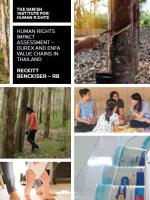
Human rights impact assessment – Durex and ENFA value chains in Thailand
The Danish Institute for Human Rights has assessed the human rights impacts of the UK health, hygiene and nutrition company Reckitt Benckiser (RB) operations in Thailand. This human rights impact assessment focuses on RB’s impacts across the value chains related to two of its key brands in the country, namely Durex (condoms) and Enfa (infant formula).
The human rights impact assessment undertaken by the Institute, commissioned by RB and with support from the non-profit organization Earthworm Foundation, is the first human rights impact assessment commissioned by the company and has served as a pilot to find new approaches for the company to assess and address negative human rights impacts in specific high-risk contexts.
Key assessment findings
The HRIA uncovered a wide range of potential and actual human rights impacts. In the latex value chain, the team found that daily rates for latex farmers and tappers did not constitute a living income, migrant workers faced substandard living and working conditions and workers were exposed to health and safety risks at plantation and processing level.
Positively, the team found that RB has community investment projects in place that contribute to building more sustainable livelihood situations of latex producing communities. Workers across factories from different steps of the value chain were found to work hours exceeding ILO standards to maximise their income and face other difficult barriers to achieving decent working conditions.
The assessment also found good practices such as constructive collaborations with a union at factory level. With regard to the sales of the end product, Durex condoms, which as a product can support users in achieving sexual and reproductive rights, it was at the same time found that these products might not always be accessible and acceptable for all consumer groups, including vulnerable consumers.
Similar working condition issues to those described above were found in factories related to the production, packaging and distribution of Enfa products. In terms of good practices, the team found that workers successfully went from temporary to permanent positions in the Enfa production facility. With regard to RB’s marketing of breastmilk substitutes, the main finding was that while RB’s Breastmilk Substitute Policy and corresponding marketing practice is aligned with the World Health Organization’s Code on Marketing of Breastmilk Substitutes, it is not yet aligned with relevant World Health Assembly Resolutions. RB’s marketing practices of their Enfa products in Thailand, while in compliance with Thai legislation, may therefore have adverse impacts on mothers and infants.
To enable RB to act on the assessment findings, the Institute developed a total of 35 recommendations for RB Corporate and RB Thailand, as well as to other industry actors. In response to these recommendations, RB has developed a human rights action plan to address the majority of the HRIA recommendations. The action plan can be found here.
The human rights impact assessment (HRIA), which took place in November 2019, focused on the value chains of two of RB Thailand’s products, Durex and Enfa. The assessment specifically focused on the Durex and Enfa brands due to their potential human rights risk, brand purpose, product nature and significance within RB’s business.
Thailand was selected for this first HRIA as one of RB’s largest 15 markets. RB has a large operational presence in Thailand and there are human rights risks at every stage of the company’s value chain.
The HRIA looked at the impacts from the sourcing of raw materials to the marketing and sales of the end products and covered RB’s own factories, key suppliers and business partners in the Bangkok region, including packaging and distribution partners. The assessment also covered in more depth the latex value chain, covering smallholder rubber plantations, collection centres and latex processing facilities.
To gain external views on the topics covered in the assessment, the Institute spoke with external expert organizations, including UN agencies, NGOs, unions and others. In total 163 individuals were interviewed as part of the HRIA.
We strive to make the pdf versions of our publications etc. accessible for screen readers. If you experience any problems, please contact Digital Editor Stine Juhl Nielsen on stni@humanrights.dk
